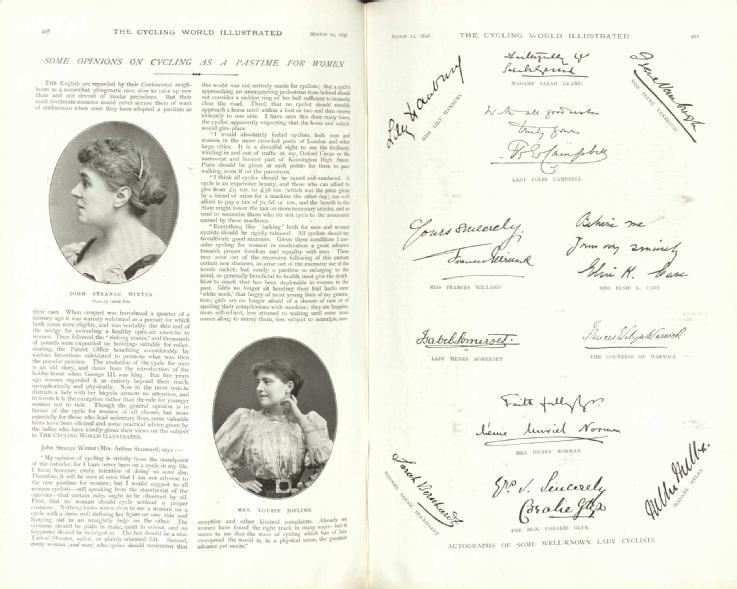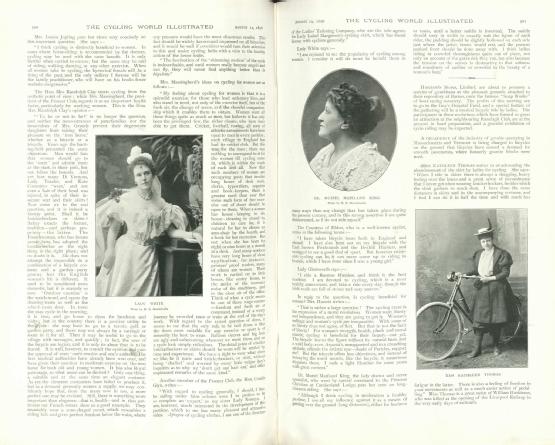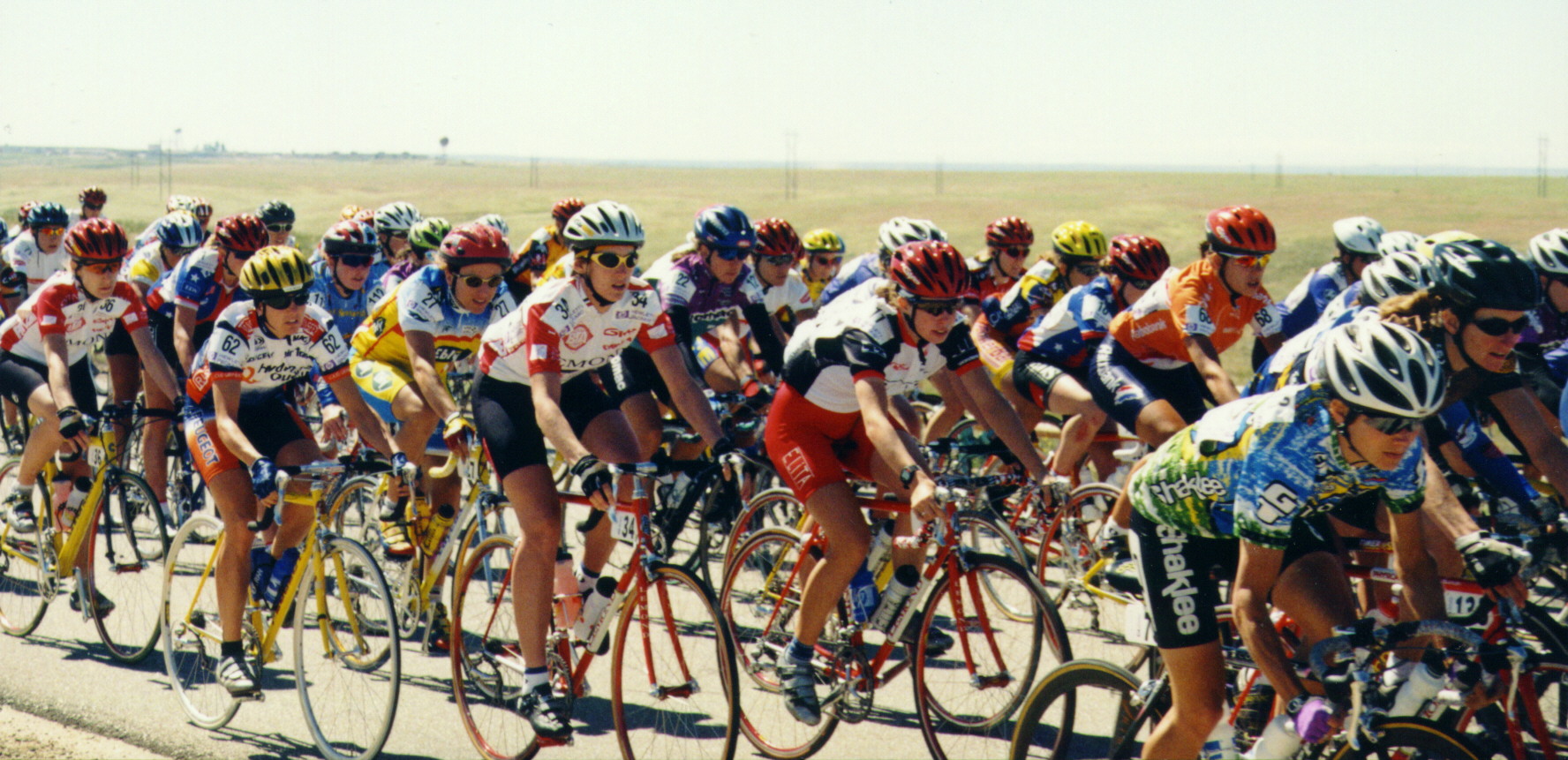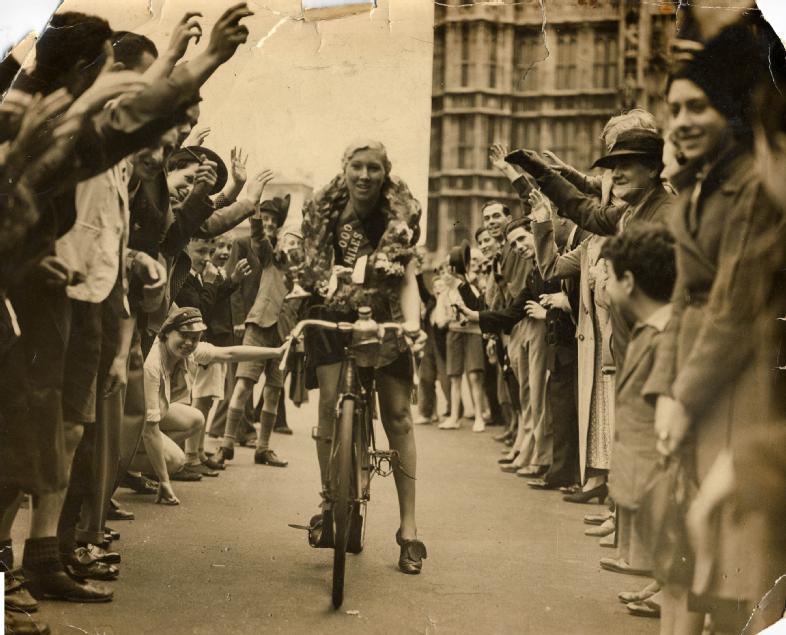Revolutionaries, cycling and psychology
As competitors taking part in women's cycling events accross the globe line up on the starting lines, poised on their performance-engineered bikes, dressed in their technical kit, and with a race plan in their mind, it’s hard to believe that just over 100 years ago there was active debate taking place in society as to whether cycling was very becoming of a lady.
The Modern Records Centre, at the University of Warwick, houses the archives of many national organisations and movements – among them is the National Cycle Archive 1675-2015, established in 1990 by the Cyclists' Touring Club. Its primary aim is the preservation of records relating to cycles and cycling. Within the collection are diaries, magazines, letters and photographs relating to the pastime of cycling and capturing the development of the sport.
Moral revolution
The collection happens to document the progress of cycling as a pursuit for women. A copy of The Cycling World Illustrated from August 1896, devotes a four page spread to discussing the rise in popularity of cycling for women of all classes, entitled Some Opinions on Cycling as a Pastime For Women. The article notes the meteoric rise in the number of female cyclists, noting, “..five years ago women regarded it as entirely beyond their reach, metaphorically and physically.”
Various women of note were interviewed for the piece, all of whom are broadly supportive. One particular interviewee, Mrs Haweis, notes the link between cycling and the suffrage movement: “The cycling craze is the expression of a moral revolution. Women want liberty and independence and they are going to get it. Woman’s suffrage and woman’s cycle are inseparable.”
Knickerbockers
Another of the most notable aspects of the advance of cycling for women, was the emergence of a whole new way of dressing – women wearing trousers. A Miss Kathleen Thomas explains to the magazine: “When I ride in skirts there is always a dragging, heavy feeling over the knees and a great sense of encumbrance that I never get when wearing knickerbockers, besides which the skirt gathers so much dust. I have done the same distances in skirts, and in the accompanying costume and I find I can do it in half the time and with much less fatigue in the latter. There is also a feeling of freedom in your movements as well as a much easier action of pedalling.”
 Fast forward 120 years and wearing the right kit is still a concern for the modern athlete, but what does it take to become a winner? Dr Harbinder Sandhu is Associate Professor and Health Psychologist at Warwick Medical School, who has worked with professional sportspeople on aspects of their performance.
Fast forward 120 years and wearing the right kit is still a concern for the modern athlete, but what does it take to become a winner? Dr Harbinder Sandhu is Associate Professor and Health Psychologist at Warwick Medical School, who has worked with professional sportspeople on aspects of their performance.
She says: “Elite professional female competitors in sports like cycling will race to win stages in a gruelling long-distance battle. They will have trained long and hard, worked on their position, their strength and their physical stamina, but many of them will have needed to work on their mental strategy too and that’s where psychology comes in. Working with an athlete we can help develop their performance by focussing on their mind as well as physical performance.”
Motivation
“In cycling motivation is one of the key attributes that can determine success in competition,” says Dr Sandhu. “For some it is important to reflect on personal or individual goals as well as wider team goals within a competition. Personal goals could include a sense of accomplishment, targets related to personal health and fitness or something skills-based. Motivation can also link to the competiveness of the cycling tour, for example a goal may be to achieve a certain finish time, a Personal Best or to finish the tour in the best possible position (i.e. first place). Motivation will play a key part in the hours and effort put into training as well as the actual tour itself. If motivation is lacking, then it may be necessary to reflect on current challenges and re-visit goals.”
Focus
The tour will involve many hours in the saddle, so how do the women keep their minds focused? “Athletes sometimes describe their experiences of a cycling tour as “being in their own zone”,” explains Dr Sandhu. “However the mind can often wander, which for some can be an unhelpful distraction. To keep focused athletes can employ techniques like mindfulness or being aware of the body (doing a body scan, to become aware of any tension, focusing on breathing and connecting the mind, body and bike). Competitors could also reflect on their goals reminding themselves why they are in the race and what they want to achieve. Having key trigger words or mantras can also help refocus the mind, and for some athletes these could be linked to times of pain or fatigue and include phrases such as “steady and strong”. Having a sense of awareness of other cyclists in a competitive environment can also keep the mind focused, and help set a race pace.

Self-belief
“Having self-belief and confidence can be the difference between a successful cycling tour and a non-successful one,” continues Dr Sandhu. “Confidence can be enhanced through practice and mental preparation. The number of women athletes taking part in cycling although has increased over the years, still lags behind male athletes. There is some suggestion that this could be due to the lack of self-belief in engaging in the sport and exceling in it. For athletes involved in cycling, preparation through training, diet and fitness can all contribute to self-belief and confidence. Preparation can involve physical preparation or mental and visual preparation (visualisation). For each athlete, having an understanding of what helps them with their confidence is important and this awareness can then be used as a gateway to enhancing and nurturing their confidence. Reflection on successful past tours, and good performance in training can also help build self-assurance.”
Commitment
“Competing in events, such as the Women’s Tour 2017, takes months and years of training for some. Dedicated training takes commitment, motivation and determination. The training goes beyond the physical, and into mental preparation and managing things like a strictly controlled diet. Some women balance this commitment with their everyday life demands, whether this is work, family or other responsibilities. Often sacrifices are made and having the support of friends and family is essential for motivation to continue. Commitment can also enhance self-belief and reinforce personal goals, either linked to training or the actual cycling tour itself.
Mental strength
“One of the common fears amongst cyclists during a competition is that of falling and physical injury,” says Dr Sandhu. “This fear can lead to feelings of anxiety and interfere with performance. My experience of talking to professional cyclists is that sometimes the fear is related to previous experiences of falling, whether in training or competitions, or seeing others fall. To manage this, we use techniques like rationalising thoughts or planning distractions. Physical experience through exposure to various weather conditions during training and using a range of descents are also useful techniques when building mental strength.
“Tension and anxiety can impact on physical ability, so remembering to breathe, relax and getting into the mind set before a competition is important. Solo riding during a tour can be testing mentally as well as physically. Being able to manage your thoughts, a wandering mind, fear and anxiety are all important. Just as physically preparing using skill and practice, having the right equipment and clothing all contribute to a successful ride, mental preparation for overcoming times of struggle during the tour by practising ways of refocusing the mind will be just as valuable,” concludes Dr Sandhu.
 Dr Harbinder Sandhu is Associate Professor, Division of Health Sciences (Warwick Clinical Trials Unit), University of Warwick. She is a Health Care Professions Council (HCPC) Registered Health Psychologist and a Chartered Psychologist with the British Psychological Society (BPS).
Dr Harbinder Sandhu is Associate Professor, Division of Health Sciences (Warwick Clinical Trials Unit), University of Warwick. She is a Health Care Professions Council (HCPC) Registered Health Psychologist and a Chartered Psychologist with the British Psychological Society (BPS).
She combines her clinical role as a Health Psychologist and her academic research in the area of behavioural change interventions in the management of long term pain.
Her primary research is in clinical trials, and her research interests include: the application of health psychology in the design of complex interventions for behaviour change in the management of long term conditions including musculoskeletal disorders, chronic pain, neurological conditions and rare diseases (Dystonia). She is also interested in integrating new technologies and evidence based therapeutic approaches such as Cognitive Behavioural Therapy and Mindfulness
During the London Olympics 2012 she gave psychological training to the Bhutan archer Sherab Zam and her coach Tshering Choden who competed in the London 2012 games and trained at The University of Warwick.
 The Modern Records Centre, founded in October 1973, is the main British repository for national archives of trade unions and employers' organisations, and also has strong collections relating to pressure groups, fringe political parties and transport. To celebrate the Women's Tour speeding through the University of Warwick campus for a second year in a row, the MRC has digitised a selection of sources on pioneering women cyclists and the surprisingly prominent role of the bicycle in the fight for women's rights. Visit the collection here: Freedom on two wheels: The New Woman and the bicycle
The Modern Records Centre, founded in October 1973, is the main British repository for national archives of trade unions and employers' organisations, and also has strong collections relating to pressure groups, fringe political parties and transport. To celebrate the Women's Tour speeding through the University of Warwick campus for a second year in a row, the MRC has digitised a selection of sources on pioneering women cyclists and the surprisingly prominent role of the bicycle in the fight for women's rights. Visit the collection here: Freedom on two wheels: The New Woman and the bicycle
